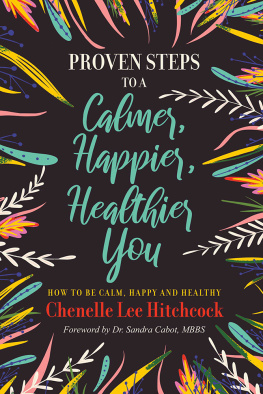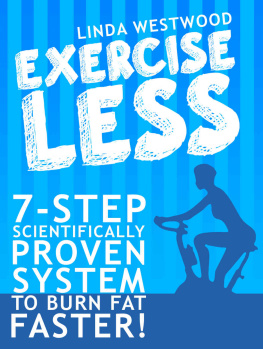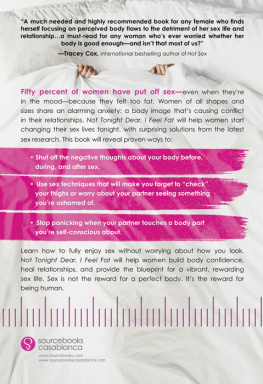What women have to say after trying the LEVITY program:
I lost 5 pounds, and I wasnt really on a diet!
I have a lot more energy.
I no longer feel like Im on the edge of losing it.
I wake up refreshed, not worried.
My husband says I look much healthier.
Sex is more enjoyable now.

Notice
This book is intended as a reference volume only, not as a medical manual. The information given here is designed to help you make informed decisions about your health. It is not intended as a substitute for any treatment that may have been prescribed by your doctor. If you suspect that you have a medical problem, we urge you to seek competent medical help.
Mention of specific companies, organizations, or authorities in this book does not imply endorsement by the publisher, nor does mention of specific companies, organizations, or authorities in the book imply that they endorse the book.
Internet addresses and telephone numbers given in this book were accurate at the time it went to press.
2002 by Marie-Annette Brown, Ph.D., and Jo Robinson
Cover photograph Derek P. Redfearn/The Image Bank
All rights reserved. No part of this publication may be reproduced or transmitted in any form or by any means, electronic or mechanical, including photocopying, recording, or any other information storage and retrieval system, without the written permission of the publisher.
is reprinted with permission from Women and Health, vol. 34, no. 3.
2001 The Haworth Press, Binghamton, New York.
Interior design by Darlene Schneck
Cover design by Carol Angstadt
Graph and chart design by Christina Gaugler
Library of Congress Cataloging-in-Publication Data
Brown, Marie-Annette.
When your body gets the blues : the clinically proven program for women who feel tired and stressed and eat too much / Marie-Annette Brown and Jo Robinson.
p. cm.
Includes bibliographical references and index.
eISBN-13: 9781609612832 ebook
ISBN 157954486X hardcover
1. Depression in womenPopular works. 2. WomenHealth and hygiene. 3. Stress management for women. I. Robinson, Jo, date. II. Title.
RC537 .B763 2002
616.85'27'0082dc21 2001006285

Contents
Acknowledgments
S uccessful research requires dedication and teamwork. Jo Robinson and I are deeply grateful to the 112 women who invested their precious time to conscientiously participate in all the activities required to test the LEVITY program. Equally essential was the hard work and commitment of the University of Washington School of Nursing LEVITY research teamSusan M. Casey, Ph.C., M.S., R.N.; Ann Frolich, M.N., F.N.P.; Jamie Goldstein-Shirley, Ph.C., M.S.N., R.N.; Crista Langstrom, M.N., F.N.P.; Kathy Pearce, M.N., F.N.P.; and Vernetta Stewart, M.N., P.S.N.P. Their enthusiasm, creativity, and collaborative spirit helped us conduct a successful study despite our limited funding. We are particularly grateful for the leadership and organizational and analytic skills of Jamie Goldstein-Shirley, doctoral candidate in nursing, who tirelessly served as project manager and creatively enhanced our design and analysis as a co-investigator and creator of this intervention trial.
We are also deeply grateful for the encouragement and assistance of my University of Washington colleagues as we carried out this challenging and all-consuming research project that included months of analysis and writing. My special thanks to my department chairs, Marcia Killien, Ph.D., R.N., F.A.A.N., and Kristen Swanson, Ph.D., R.N., F.A.A.N. I also want to acknowledge the help and support of the administrators and staff at the Womens Center, especially Emily Wong, M.D., and Grace Parker, M.N., R.N. Our special thanks to Frances Robinson, our pre-editor, who enabled us to present a manuscript to our editors at Rodale that required little additional work.
We are indebted to our agent, Richard Pine, for his expertise in conceiving and marketing health books. Richard helped shape When Your Body Gets the Blues from its inception and found it a happy home at Rodale.
At Rodale, we want to give special thanks to Tammerly Booth, editor-in-chief; Sharon Faelten, our patient and insightful senior editor; Karen Neely, our enthusiastic line editor; and Cindy Ratzlaff, executive director of publicity. We enjoyed very much working with these particular women and also with a publishing company that places a high premium on healthy people and a healthy planet.
We want to acknowledge the Center for Womens Health Research at the University of Washington and the Psi Chapter of Sigma Theta Tau, the nursing honorary society, for providing key financial support for the LEVITY study.
Finally, we wish to acknowledge our beloved family members and friends for their unflagging support and encouragement.
Marie-Annette Brown, Ph.D., R.N., and Jo Robinson
Chapter
The Body Blues
Womens Number One Mood Problem
A t any given time, tens of millions of women are troubled by a syndrome for which they have no name. One of the most common complaints is feeling tired and sluggish much of the time. To their dismay, the women dont have enough energy to be the patient moms, supportive partners, or fun-loving friends they would like to be. Although they know that exercise would help revive them, they rarely have both the time and the motivation.
Many women with this syndrome have sleep difficulties as well. They have trouble falling asleep or staying asleepor they sleep too much. The common denominator is that they feel drowsy during the day, whether due to a lack of sleep or general drowsiness. Those times when they feel alert and energetic all day long are a welcome relief.
Difficulty concentrating is another telltale sign of this disorder, especially in women 35 and older. The women have trouble focusing on tasks, absorbing complex information, or finding just the right words to say when they talk. Verbal slips and difficulty remembering nameseven the names of people they know really wellcan be a source of embarrassment. Curiously, these mental lapses can come and go. For days at a time, they feel mentally sharp. Then, for some unknown reason, their thinking becomes fuzzy or scattered. Its as though their IQs had dropped 10 points overnight. Middle-aged women can be especially troubled by these mental symptoms because they fear they might have the early signs of Alzheimers disease.
Many of the women also feel stressed and irritable. They can be annoyed by simple things such as the sound of construction from a neighbors house, a partners eating habits, or being put on hold on the phone. Even when the pressure is off, some women find it hard to relax. A drink or two is a fast way to unwind, but relying on alcohol to relax can lead to alcohol dependency. A more common way to relieve stress is to watch TV or read a book. These two remedies work reasonably well, but they take away from the little time women have to be creative or take on ambitious projects.
But the most common and vexing symptoms of this syndrome are overeating and weight gain. In the morning, most of the women have little trouble controlling their appetite. But sometime in the afternoon, they begin to snack. They also feel an urge to eat whenever they are feeling anxious, tired, or stressed. Women say that certain foods are more soothing than others, especially pasta, pizza, sweets, bread, and chocolate. In fact, a craving for sweets and starches is one of the defining characteristics of this syndrome.









